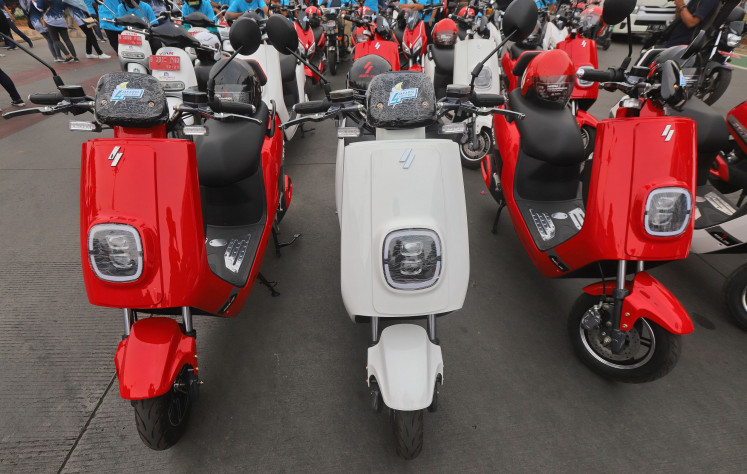RI cooking oil crisis takes a global turn
AGO digs deeper into CPO export permit graft case.
Change text size
Gift Premium Articles
to Anyone

A
cooking oil crisis that was initially triggered by the Russian-Ukrainian war is now shaking up both domestic politics and the global supply chain after the government announced last week it would ban all exports of crude palm oil (CPO), a key ingredient of cooking oils, amid a series of student protests against skyrocketing food prices.
The government is under increasing pressure to control inflation, in particular the surging prices of much sought-after cooking oils. This has become a rallying cry for student protesters already miffed by recent controversies over a proposal floated by avid supporters of President Joko “Jokowi” Widodo to delay the 2024 presidential election and extend his final term in office.
While the export ban is set to disrupt the global supply, the cooking oil crisis has taken a political turn in Indonesia, with a member of the nation’s largest ruling party claiming that the crisis was linked to the efforts to extend the President’s term.
The government’s CPO export ban, which has shocked the global market, came only two days after the Attorney General’s Office (AGO) detained a senior Trade Ministry official and three corporate executives over alleged violations in processing palm oil export permits. The executives are from private cooking oil producers Permata Hijau Group, PT Wilmar Nabati Indonesia and PT Musim Mas, all members of the Indonesian Palm Oil Association (GAPKI).
Industry players have cried foul over their arrests, saying that the three accused executives had followed the existing regulations. Vegetable oil producers have responded to the AGO’s move by threatening to withdraw from the government’s subsidized bulk cooking oil program over cooking oil and CPO regulations that had only burdened the sector.
‘More suspects’
The AGO was still investigating the graft case and not ruling out that it could name more suspects, regardless of their position or background, and interrogate the trade minister if needed, Febrie Adriansyah, the assistant attorney general for extraordinary crimes, told a press conference on Friday.
“If we find evidence that points to the involvement [of anyone else] in the case, we will name them as suspects,” said Febrie, adding that it was also possible to lay money laundering charges against the suspects.
He said AGO investigators were working closely with auditors from the Development Finance Comptroller (BPKP), which was calculating potential losses to the state and negative impacts on the economy from the alleged graft.
By Friday, AGO investigators had questioned 30 witnesses, examined around 650 documents and searched 10 locations for evidence, including the residences of the ministry’s foreign trade director general, Indrasari Wisnu Wardhana, who was named as a suspect, as well as the offices of the three suspected executives.
Political turn
Masinton Pasaribu, a lawmaker from the Indonesian Democratic Party of Struggle (PDI-P) faction and a member of House of Representatives Commission XI overseeing financial affairs, said he had received information alleging that the illicit processing of CPO export permits was a way to finance the potential extension to President Jokowi’s final term in office by delaying the 2024 elections, according to CNN Indonesia.
He claimed on Saturday that the cooking oil shortage and price hike and some companies prioritizing exports was caused by a need to raise funds “to maintain [the campaign] to postpone the elections", as quoted by CNN Indonesia.
Masinton said this alleged purpose could be linked to some farmers who had declared their support for an extension to Jokowi’s term in office, suggesting that the farmers had been backed by large CPO corporations.
In late February, Coordinating Economic Affairs Minister and Golkar Party chairman Airlangga Hartarto claimed during a visit to Siak, Riau, that local oil palm farmers had expressed their aspirations that Jokowi remain in office beyond the constitutionally mandated term.
The President has ordered his ministers to stop talks about the presidential term and said his government would organize the next elections in February 2024.
Global implications
Finance Minister Sri Mulyani Indrawati said the government was aware that the CPO export ban would hurt other countries, but stressed it was necessary to bring down the domestic price of cooking oil, as demand had exceeded supply.
Indonesia the world's largest producer, accounting for more than half of the world's palm oil supply. China and India are among major importers of Indonesia’s palm oil, which is used in products from cooking oils to processed foods, cosmetics and biofuels.
An Indian trade group has called the ban "rather unfortunate and totally unexpected”.
"We know that this is not going to [have] the best result" on global supplies, she told Reuters on Friday on the sidelines of the 2022 International Monetary Fund and World Bank Spring Meetings. "If we are not [exporting], this will definitely hit other countries."
Indrawati said the government’s previous measure requiring producers to reserve a portion of their CPO export volume for domestic use did not result in "the level of prices that we wanted. It was still too expensive for the ordinary household to buy cooking oils".
At last week's meetings in Washington, policymakers expressed growing concern over a potential food crisis due to the war in Ukraine, which is a major producer of wheat, corn and sunflower oil.
– Dio Suhenda and A. Muh. Ibnu Aqil also contributed to this story.









